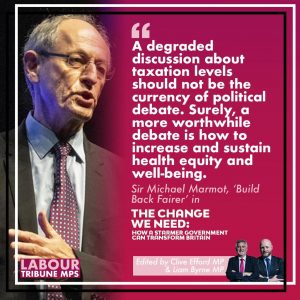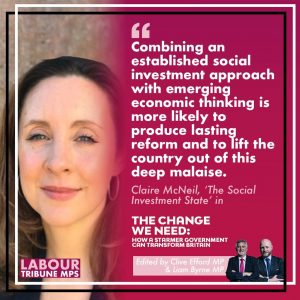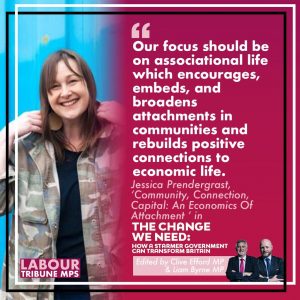It is time to restore our commitment to end child poverty for good
It will be 80 years in December since the Beveridge report was published which promised every family and every pensioner, “Freedom from Want Disease, Ignorance, Squalor and Idleness”. And it was the Labour government of 1945 that then created the NHS to deliver free universal healthcare based on need – not the ability to pay – and set up the modern social security system designed to take the shame out of need.
And in the decades that followed, there was an assumption that no political party would break the post-war consensus created by Labour that a welfare state was there when people needed it – and most of all for those with the greatest needs.
But now under the current Conservative government, we are seeing poverty that no one thought they would ever see again. It is poverty that is even more striking than what I saw when unemployment hit the mining and textiles town in which I grew up.
And today’s poverty is even more unacceptable because it exists, not because we are a poor country, but rather because in one of the world’s richest countries the divide between those with and those without has escalated over the last decade.
This ongoing poverty crisis is sending children back to school ill-clad and hungry, forcing fearful pensioners to choose between heating and eating, and millions are dreading the coming winter because they will not be able to make ends meet. The accounts of staff at my local family centre in Kirkcaldy include children with no bed or even blankets and only the floor to sleep on.
It is a poverty that is threatening to expand beyond low income households into middle income homes and creating a generation of young people not just losing out and going without – but left out – and unable to afford activities their school friends are doing.
In October, when despite the promise of an energy price freeze, fuel bills are slated to rise 25% after a previous 60% hike in January. All told, 4.1 million families will be paying an unprecedented 20% of their income on fuel bills from October. The figure will be 7.5 million by next May, and 2.2 million families will be charged a virtually unplayable 30% of their income in October, rising to 3.8 million families by next May. And now, for the first time in decades, the main social security benefits – Universal Credit – according to Loughborugh University’s new study, now cover only half of what we would describe as the basic needs of a family with children.
We have moved from a decade where austerity was the official policy of the government to a second decade where without announcing it and often denying it Conservative ministers are standing aside as poverty rises at precisely the moment they should be stepping up to help.
And now, for the first time since 1945, government public information sites are redirecting people from the welfare state to external charities. And it is the food bank and not the welfare state that is the last line of defence for Britain’s poor. It is charity not the Department for Work and Pensions that has become the life line. It is voluntary help not the social security system that is the last resort.
When we hear of privatisation, we are conditioned to thinking of railways, buses, telecoms and utilities moved into private hands – the basic assumption being that market forces will enter in and provide a service previously guaranteed by the state. The social fabric which has for years has been knitted together is now being torn apart thread by thread. And over the last decade, we have witnessed the unannounced and creeping privatisation of welfare – a sadly unmistakable downward trend whose origins lie in engrained prejudices that in speeches and writings the new Prime Minister has attempted to popularise, targeting the needy as lazy, work-shy and part of a dependency culture.
But the public do not agree. When asked how badly or well the government is doing at addressing its challenges, poverty alongside the cost of living crisis is the issue where complaints are greatest. What is more, an overwhelming majority of the British public – 70% – now think the relief of poverty is in the top three issues facing the country. In some areas like Scotland, Wales, and the North, it is the number one issue. But even in the wealthiest parts of England, the concern is now rising so fast it is moving right to the top of people’s agenda.
It is time for the government to take action before a further intensification of poverty hits our country come winter.
All the evidence is that solutions to poverty cannot be achieved by Truss trickle-down economics – by tax cuts for the rich that will never materialise in benefits for the poor. Nor can it be solved by retreating into a separatist agenda because it is only by pooling and sharing across the whole of the country that we find the resources to attack poverty.
And so it is time for the U.K. to restore the commitment made in 2000 to end child poverty and to match that with a promise to abolish pensioner poverty. The last Labour government did not do all we set out – and hoped – to do, but we were on the way to abolishing pensioner poverty. And in addition to introducing nursery education for all, Sure Start, educational maintenance allowances, and the Child Trust Fund, we raised child benefit, introduced child tax credits, and halved child poverty on the road to its abolition.
The gaping hole in the Conservative government’s “Levelling Up” agenda is the failure to ensure that every child in every part of the country has a fair start free of poverty. Keir Starmer has announced that he will cap fuel prices at £1,971, reform the warm home discount scheme, and end the injustice of higher tariff cost for prepayment meters.
It is Labour’s contention and the mark of a civilised society that every child have the chance to realise their full potential – to bridge the gap between what they are and what they have in themselves to become – and that every pensioner can enjoy a dignified old age free of poverty. We owe our neighbours in need nothing less.





